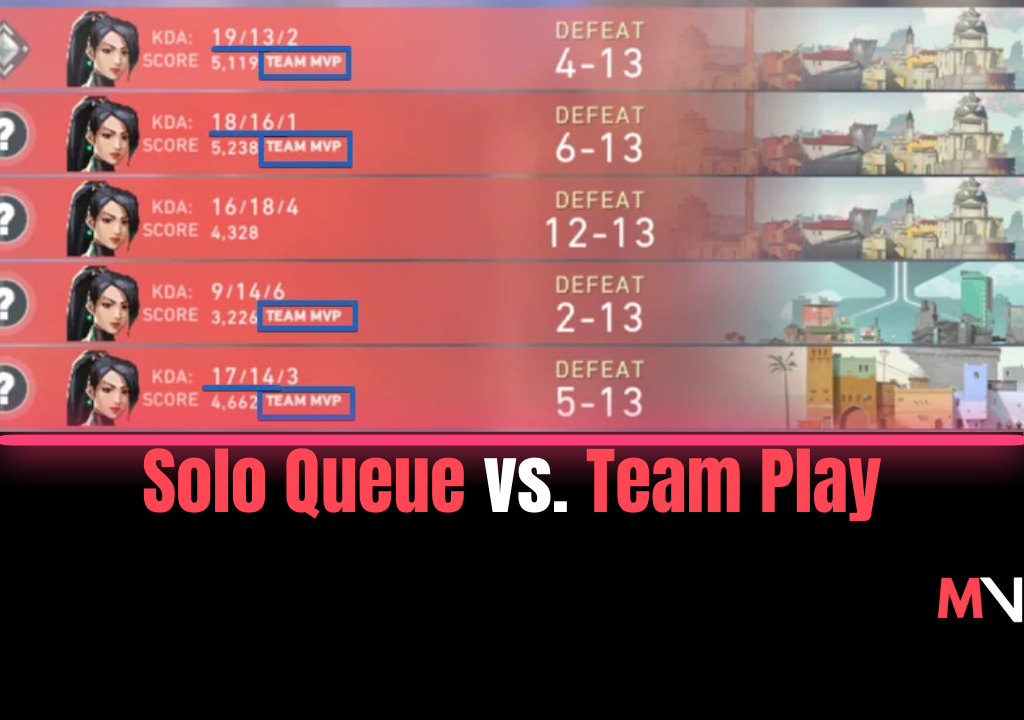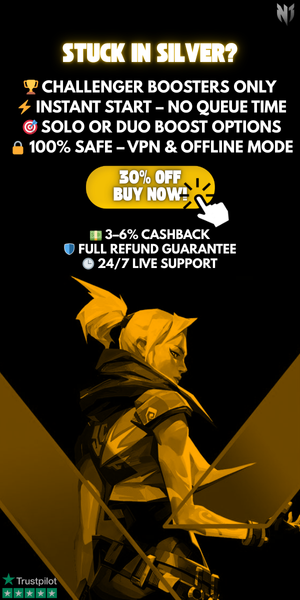Solo Queue vs. Team Play: How Party Size Affects Your MMR Gains
In Valorant, your MMR (Matchmaking Rating) is the cornerstone of your ranking. It determines how well you’re matched against opponents and reflects your skill level. However, many players are curious about how different queue types—Solo Queue versus Team Play (also called Party Play)—affect MMR gains and losses. Is it easier to climb the ranks when you play alone, or does having a full team of friends boost your chances of success?
In this blog, we’ll analyze how party size and queue type impact your MMR gains, helping you understand the strategic advantages and challenges of each. Whether you prefer playing Solo Queue or queuing up with a team, understanding these differences will help you optimize your gameplay and climb the ranks more efficiently.
Solo Queue: The Challenges and Rewards
Solo Queue is the most common queue type for players who prefer to climb the ranks on their own. In this mode, you’re matched with random teammates, which can lead to a wide variety of team dynamics, both positive and negative.
Impact on MMR Gains and Losses
- Increased MMR Variability: When you queue solo, your MMR tends to fluctuate more than when you play in a team. This is because your MMR is determined by both your performance and the performance of your randomly assigned teammates. If your team underperforms, your MMR can drop significantly, even if you play well. Conversely, if you win and play well, you can see substantial MMR gains.
- Win Conditions and Team Coordination: Solo Queue can be more unpredictable because you have less control over how your team plays. If your teammates don’t communicate well or make poor decisions, it can negatively affect your MMR. However, if you can carry your team or have great individual performances, you’ll earn more MMR than you would in a team match.
Solo Queue Advantages
- Skill Expression: Solo Queue allows you to show off your individual skills. Since you have full control over your gameplay, your MMR increases based on how well you perform.
- Climbing Solo: For players who are determined to rank up on their own merit, Solo Queue is the ideal way to do so. It offers a purer test of your skill because you’re matched against random players.
Solo Queue Disadvantages
- Team Unpredictability: You’re dependent on the performance of your teammates, which can result in highly inconsistent games. This can be frustrating if your team loses despite your best efforts.
- Increased Tilt Risk: Solo players may find themselves more frustrated if they encounter toxic teammates or unlucky situations, leading to tilt (emotional frustration) that can negatively affect performance and MMR.
Team Play (Party Queue): The Benefits and Drawbacks
In Team Play or Party Queue, players queue up with friends or teammates. Party Play offers a more coordinated experience, allowing you to communicate better and strategize together. However, does playing with a team offer higher MMR gains?
Impact on MMR Gains and Losses
- Higher Consistency: Party Play often results in more consistent MMR progression because of better communication, strategic coordination, and the ability to play with teammates who are familiar with each other’s playstyles. If you and your team are performing well, your MMR will rise steadily. Even if you lose a match, if you perform well individually, your MMR won’t drop as drastically compared to Solo Queue.
- Favorable Matchmaking: When playing with a team, the system places you against similarly coordinated teams. However, the MMR adjustment is slower because the system accounts for the fact that playing in a team with good coordination is different from playing with random teammates. MMR changes will be more predictable as your overall performance is less dependent on random teammates.
Team Play Advantages
- Better Communication: Team play allows for better coordination, callouts, and strategic planning, which can lead to better overall match outcomes and fewer losses.
- Stabilized MMR: You’re less likely to have wild fluctuations in MMR because your team’s coordination and overall performance are more consistent. Players with high coordination tend to win more often, especially when compared to random teammates in Solo Queue.
- Reduced Tilt: Playing with friends or teammates you trust can reduce the emotional burden of losing and help you stay more level-headed, improving your overall MMR performance over time.
Team Play Disadvantages
- Ranked System Adjustments: Since MMR is adjusted based on the collective performance of your team, large differences in individual performance within a Party Queue may cause a slower MMR increase. The system may favor players who are consistently performing well, but it takes longer to see gains compared to Solo Queue players with consistent individual performance.
- Queue Size Limitations: Playing in a team can sometimes limit your MMR gains based on your party size. For instance, if your team is composed of multiple Radiants and a few Gold players, matchmaking will adapt, and you might face more difficult opponents, which can slow your MMR progression.
Solo Queue vs. Team Play: Which One Impacts MMR More?
Both Solo Queue and Team Play have their benefits and drawbacks when it comes to MMR progression. So which one impacts your MMR more?
- Solo Queue: Offers greater fluctuations in MMR based on your individual performance and random teammates. Win streaks can significantly increase your MMR, but losses can be harsh if your team underperforms.
- Team Play: Results in more stable MMR gains due to better coordination and communication. You may experience slower progress compared to Solo Queue, but your MMR will rise more consistently with a coordinated team.
Solo Queue often allows for faster progress if you're playing well individually, while Team Play gives you more stability but can be slower to gain MMR due to matchmaking adjustments.
How to Optimize Your MMR Progress in Both Queue Types
Solo Queue Tips:
- Focus on individual improvement: Enhance your aim, positioning, and decision-making to maximize your MMR gains.
- Keep a positive mindset: Avoid tilt by focusing on what you can control—your performance and attitude.
Team Play Tips:
- Communicate effectively: Use voice or text chat to make callouts, discuss strategies, and stay positive.
- Play with consistent teammates: Playing with a group of friends who understand each other’s playstyle and strategies can help improve MMR faster.
Want to track your MMR and understand how Solo Queue and Team Play affect your progress? Use mmrvalorant.com to analyze your MMR and performance across different queue types. Start today and make more informed decisions on how to climb the ranks!
Tags

admin
Author




